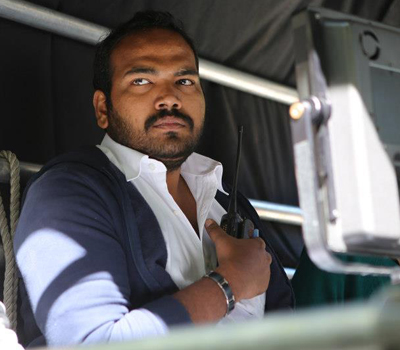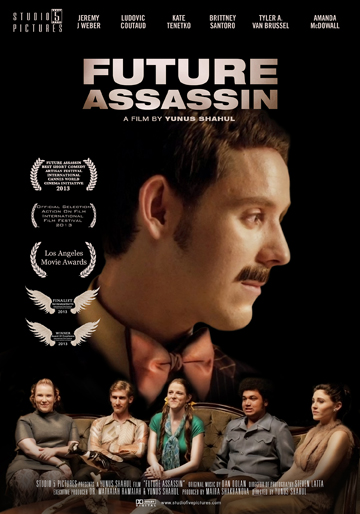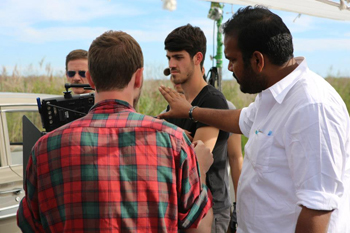 YUNUS SHAHUL:
THE FUTURE ASSASSIN
Yunus Shahul is a creative
filmmaker, who steadily worked his way towards becoming a filmmaker
from his childhood. Growing up in India, his fascination with films
of every genre were endless, and his hopes of becoming a part of the
industry began to blossom. But unfortunately, this was not accepted
as a plausible career by his family and Yunus relented into joining
a medical college to ensure his family�s happiness. When Yunus�s
aspirations of becoming a filmmaker reached its peak during college,
he garnered enough strength to drop out of college and travel to New
York. He worked as a waiter in New York City for years to acquire
enough savings to join and complete the New York Film Academy One
Year filmmaking intensive program. Yunus Shahul's film
debut �Unrequited Love� was a high quality and low budget short
action film. It deals with the tragedy of a bride violently raped
and killed on her wedding day. Yunus Shahul's unique and
unconventional portrayal of this subject, was admired by many and
helped set in motion his next drama film �Denial�.
This emotional independent film, written and directed by Yunus
Shahul, portrays a wife's emotional betrayal by her husband, not by
another woman but by his own twin brother.
Yunus Shahul's latest film �Future Assassin� is a coming of age
short comedy that takes place in the Midwest in the 1960's. It is a
story of a young high school student, scorned by his first love, who
attempts to take revenge on his ex-lover with the help of five zany
strangers and time travel.
Yunus Shahul has received laurels form the Los Angeles Movie Awards
as well as an award for best short film comedy from Artisan Festival
international (World Cinema festival), for this extraordinary short
and got the official selection At Action on International film
festival in California, 2013. |
Q:
What was your overall role?
I
was involved in �Future Assassin� project as an Executive Producer,
Director, Writer and Casting.
Q:
Did you always want to be in the film Industry?
Yes. I have always been fascinated with films since I was a little
child in India. I never knew exactly what my role would be in
filmmaking at that age, but I knew I wanted to be a part of the
industry. I never dreamt at that time that I would be making films
in the U.S which feels incredible.
Q:
Tell us how Future Assassins evolved.
It
began as a story about class, gender differences, politics and love
amongst this backdrop. But it evolved into a movie that talked
about these concepts in a more lighthearted way, trying to mix
dramatic and comedic storytelling into a visual uniqueness by
telling the story in the 1960�s.
Q:
Did you have any unusual difficulties during filming?
Yes
actually. One of my actors got injured in the middle of a take,
and was sent to the hospital immediately. This affected the entire
cast and crew including myself emotionally, and the challenge of
continuing with the shoot and convincing the others to do their best
in their respective roles is something I would never forget.
Fortunately, The actor who was injured reported back to the set the
next day with a very minor injury, and the enthusiasm that we began
making the film with was back.
Q:
Will winning awards help promote the film? How so?
I
believe it does, because of the fact that it is being showcased
around the world and audiences are not only watching the film but
are really appreciating it. For me, it also is a boost for my own
confidence that a project I believed in and worked so hard for is
getting such a wonderful response, that I feel more confident about
other stories I want to tell.
Q:
How long did it take to make the film?
We
did five months Pre production and shot for eight days.
Postproduction took two months.
Q:
Where were the locations?
We
were shooting in a Town called Islip in Long Island, New York. In
fact we used just one location for the entire project, consisting of
the roads and forests in the area, as well as a historical museum.
Q:
To what audience is Future Assassins suited?
I
believe to every adult. I feel it�s a story that needs to be told
in this day and age.
Q:
What was it like working with the actors? How did you go about
choosing them? about
choosing them?
I
chose the actors based on how they identified with the characters in
the story and if they had that chemistry of being friends for a long
period of time, with similar values and ideas about life.
For Ludo�s character, I needed someone who was not only great in his
comic timing, but also who could express himself and his love in a
very touching way to the audience, and I definitely think I found an
excellent actor for this role. It was not only a great experience
but also a very challenging one to work with these actors. It was
the first time I was working with such a large cast, but fortunately
the chemistry between the cast and the crew was excellent and It was
a rewarding experience overall.
Q:
What has the feedback been so far?
I
have gotten great feedback for the film. Some people who have
watched the film, said it felt like they were watching a feature
film, others loved the fact that Future Assassin was just not a
comedy, but included other dramatic elements to the film,
particularly the love story. My favorite critique came from my
professor who said that Future Assassin has three hours of content
in just twenty-five minutes of film time.
Q:
Are you working on any new projects?
Yes
I am. I am working on two scripts based in the U.S. One is a
historical drama, and the other is a thriller. I am also working on
a script for the Indian industry, which is a suspenseful drama.
Q:
Tell us about your own background. Where you were born? Where did
you study film? What was your first movie? What was your
previous job? Are you a full-time filmmaker?
I
was born in a small village in south India, called Vandavasi. But I
was brought up in Chennai, India. To pursue my dream of filmmaking
I left India to come to New York to pursue a filmmaking course in
the New York Film Academy. In order to save up for the tuition for
school, I spent seven years working as a waiter in an Indian
restaurant. The first film I had made was �unrequited love�, which
is an action film dealing with issue of revengeful love.
Q: what was your first award? And how did you feel at that time?
My
first award was for �Future Assassin� in Best Picture Comedy short
at the Artisan festival international held in Cannes 2013. I felt
like my dreams were coming true.
Q:
What was the best part of the project?
My
aim was to present a short film that not only told a great story but
was also visually appealing. Although this story could be taken in
any period of time, I have decided to set the story in the 1960�s to
create great photography, amazing costumes and production design as
well.
Q: What was the most challenging?
Was
to achieve this 1960�s look and to make it apparent convincingly to
the audience. I have to give lots of credit to my production
designer and costume designer for helping me achieve this goal.
Q:
Are you pleased with the overall outcome?
Yes,
I am very much pleased with the results and outcome.
Q:
What are your hopes and dreams for the film?
I
just want the film to be enjoyed an accepted by audiences throughout
the world, as well as having made a lasting impression on the
audience.
Q:
How long did it take to complete the film?
Total
pre production was 5 months and numbers of shooting days were only 8
but for postproduction it took two months.
Q: Will you do a sequel?
Yes.
The way I have ended �Future Assassin� leaves a lot of questions
unanswered for the audience, which leaves a lot of room for these
questions to be answered in a feature length film.
Q:
What makes you a filmmaker?
I am
a storyteller that wishes to bring life to my story and the
characters involved. The only way I can do so is through film.
Movies breathe life to my stories visually and emotionally.
Q:
Why is this subject important to you?
I
feel it is a subject that should be important to everyone. Love is
an emotion that every human being feels, and no one should be
discriminated against for whom they choose to love. I know I have
faced discrimination in my life based on other issues, and I know
how painful it could be. But something so innately human and pure
as love should never be a cause for prejudice.
Q:
Does this film send the message you intended?
I
believe it does.
Q: Do most people just turn a blind eye when they hear of these
issues?
Well
I live in New York City, and here people are more progressive and
accepting of homosexuality. But even throughout the U.S and
countries all over the world, people are still being subjugated to
mental and physical abuse over the gender of the person they chose
to love.
Q:
Why the title?
It�s
an engaging title that relates to the sub-plot of the movie.
Q:
Advice to others who might like to follow in your footsteps?
I�d
like to tell them that making a film is a lot of hard work and
emotionally tiring, but if you are ready for the challenge and have
a burning desire to be part of the film industry like I did, every
ounce of sweat is all worth it in the end.
Q: is there anything in the past happened to you, that make you
wrote this script? If, yes, what is this?
No,
nothing specifically happened to me to make me want to write this
script. It is the people i am surrounded by everyday, friends,
associates, that made me want to write this story.
Q:
Is this a film that young people, college or high school students
could benefit from?
Definitely. The earlier a person learns about acceptance and
tolerance, there would be less hate based on pure ignorance. And
less hate amongst humanity, will give us a more beautiful world to
live in.
Q: Do you personally know anyone who inspires the movie?
There
is no specific person. It is a combination of people I know and
admire.
Q:
Has the film won any other awards?
Yes,
It has won the Best Picture Comedy Short at the Artisan Festival
International Cannes world cinema initiative 2013. I received an
official selection at the Action on International Film festival in
Monrovia, California 2013, and I was given an Honorable Mention at
the Los Angeles Movie awards 2013.
Q: Anything new to date on the film?
I am
developing a feature film script for Future Assassin.
Q: Unique stories during the making of the film?
I
think one of the most visually delightful stories was capturing the
deer in the forest. It took a lot of patience and effort from our
production designer to help the deer appear at the correct moment
during the film.
Q: what sacrifices did you make to become a filmmaker?
I
sacrificed a lot of time I could of spent with my family, by
pursuing my dream in New York. I am thankful though that they were
very supportive and are sharing my happiness with the film�s
success.
Q: How do you see yourself in the next 10 years?
I see
myself as a successful filmmaker, son, husband and father. I want
to be a filmmaker who makes an impact with the stories that I tell
not only emotionally but also visually. (tfr)
|




